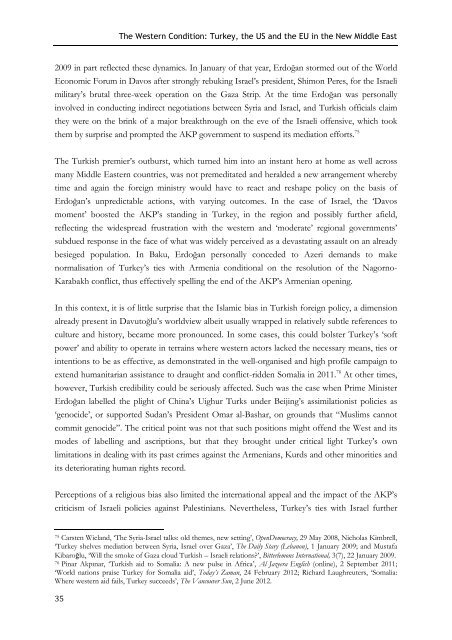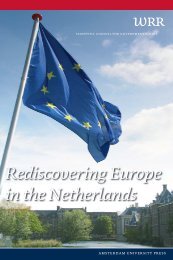The Western Condition - St Antony's College - University of Oxford
The Western Condition - St Antony's College - University of Oxford
The Western Condition - St Antony's College - University of Oxford
You also want an ePaper? Increase the reach of your titles
YUMPU automatically turns print PDFs into web optimized ePapers that Google loves.
<strong>The</strong> <strong>Western</strong> <strong>Condition</strong>: Turkey, the US and the EU in the New Middle East<br />
2009 in part reflected these dynamics. In January <strong>of</strong> that year, Erdoğan stormed out <strong>of</strong> the World<br />
Economic Forum in Davos after strongly rebuking Israel’s president, Shimon Peres, for the Israeli<br />
military’s brutal three-week operation on the Gaza <strong>St</strong>rip. At the time Erdoğan was personally<br />
involved in conducting indirect negotiations between Syria and Israel, and Turkish <strong>of</strong>ficials claim<br />
they were on the brink <strong>of</strong> a major breakthrough on the eve <strong>of</strong> the Israeli <strong>of</strong>fensive, which took<br />
them by surprise and prompted the AKP government to suspend its mediation efforts. 75<br />
<strong>The</strong> Turkish premier’s outburst, which turned him into an instant hero at home as well across<br />
many Middle Eastern countries, was not premeditated and heralded a new arrangement whereby<br />
time and again the foreign ministry would have to react and reshape policy on the basis <strong>of</strong><br />
Erdoğan’s unpredictable actions, with varying outcomes. In the case <strong>of</strong> Israel, the ‘Davos<br />
moment’ boosted the AKP’s standing in Turkey, in the region and possibly further afield,<br />
reflecting the widespread frustration with the western and ‘moderate’ regional governments’<br />
subdued response in the face <strong>of</strong> what was widely perceived as a devastating assault on an already<br />
besieged population. In Baku, Erdoğan personally conceded to Azeri demands to make<br />
normalisation <strong>of</strong> Turkey’s ties with Armenia conditional on the resolution <strong>of</strong> the Nagorno-<br />
Karabakh conflict, thus effectively spelling the end <strong>of</strong> the AKP’s Armenian opening.<br />
In this context, it is <strong>of</strong> little surprise that the Islamic bias in Turkish foreign policy, a dimension<br />
already present in Davutoğlu’s worldview albeit usually wrapped in relatively subtle references to<br />
culture and history, became more pronounced. In some cases, this could bolster Turkey’s ‘s<strong>of</strong>t<br />
power’ and ability to operate in terrains where western actors lacked the necessary means, ties or<br />
intentions to be as effective, as demonstrated in the well-organised and high pr<strong>of</strong>ile campaign to<br />
extend humanitarian assistance to draught and conflict-ridden Somalia in 2011. 76 At other times,<br />
however, Turkish credibility could be seriously affected. Such was the case when Prime Minister<br />
Erdoğan labelled the plight <strong>of</strong> China’s Uighur Turks under Beijing’s assimilationist policies as<br />
‘genocide’, or supported Sudan’s President Omar al-Bashar, on grounds that “Muslims cannot<br />
commit genocide”. <strong>The</strong> critical point was not that such positions might <strong>of</strong>fend the West and its<br />
modes <strong>of</strong> labelling and ascriptions, but that they brought under critical light Turkey’s own<br />
limitations in dealing with its past crimes against the Armenians, Kurds and other minorities and<br />
its deteriorating human rights record.<br />
Perceptions <strong>of</strong> a religious bias also limited the international appeal and the impact <strong>of</strong> the AKP’s<br />
criticism <strong>of</strong> Israeli policies against Palestinians. Nevertheless, Turkey’s ties with Israel further<br />
75 Carsten Wieland, ‘<strong>The</strong> Syria-Israel talks: old themes, new setting’, OpenDemocracy, 29 May 2008, Nicholas Kimbrell,<br />
‘Turkey shelves mediation between Syria, Israel over Gaza’, <strong>The</strong> Daily <strong>St</strong>ary (Lebanon), 1 January 2009; and Mustafa<br />
Kibaroğlu, ‘Will the smoke <strong>of</strong> Gaza cloud Turkish – Israeli relations?’, Bitterlemons International, 3(7), 22 January 2009.<br />
76 Pinar Akpınar, ‘Turkish aid to Somalia: A new pulse in Africa’, Al Jazeera English (online), 2 September 2011;<br />
‘World nations praise Turkey for Somalia aid’, Today’s Zaman, 24 February 2012; Richard Laughreuters, ‘Somalia:<br />
Where western aid fails, Turkey succeeds’, <strong>The</strong> Vancouver Sun, 2 June 2012.<br />
35

















